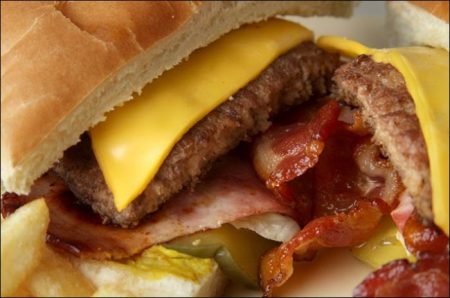What do we mean by toxic food? In his book In Defense of Food: An Eater’s Manifesto, journalist Michael Pollan shares a simple manifesto: Eat food. Not too much. Mostly plants.
Why should we be advised to “eat food?” Because, he says, most of what we consume today is not food. Instead, we are consuming “edible foodlike substances” – no longer the product of nature but of food science.
These toxic food substances contain many ingredients that are known carcinogens (cancer causing) and neurotoxins (toxic to the brain). It’s interesting to note that many of these additives, which are popular in colorful kids’ foods and convenient packaged foods, have been banned in European countries.
The Modern Industrial Food Supply
Do you find it hard to believe that any western government, including those in the US and Canada, would allow this toxic food into our food supply and encourage us to feed it to our children? As hard as it is to believe, it’s true. Powerful corporate interests and food industry lobbyists have gone so far as to rewrite nutritional findings and the resulting governmental recommendations – you can read about this in the New York Times article, in Pollan’s book, and other news sources.
To protect your health and prevent diseases, it’s essential that you take responsibility for your own health by being an informed consumer. Of course, this may not be as easy as it sounds. Companies who market toxic food offer a wide array of fake foods touting health claims on their packaging. Pollan suggests that if a food product is labeled with a health claim (all-natural, healthy, low fat) it’s a good indication that it’s not real food.
Shelf life can be another indication of fake food. The World Famous Burger Museum, inspiration for the Bionic Burger movie, reveals the true story of a man who created a burger museum after accidently leaving a Big Mac in his coat pocket for one year. His collection of burgers has lasted two decades retaining their original look and smell. What did he do to preserve them? Nothing – they are already made of immortal chemicals – “chemicals that create the illusion of food.”
You may also be surprised to find out that many of the popular foodlike items on supermarket shelves include petroleum based ingredients. When author Steve Ettlinger’s daughter asked him “Where does Polysorbate 60 come from, Daddy?” he decided to find out. He discovered that Polysorbate 60 is a gooey mix made of corn, palm oil and petroleum that can’t spoil and now replaces dairy products in Twinkies and other processed foods. To discover the true origins of each ingredient on the Twinkie label and take a peek into the major industrial complex that supports our food supply, read his book Twinkie, Deconstructed.
Where does this leave us as shoppers? What is there left to eat? Pollan’s solution is to shop as though your great grandmother were looking over your shoulder. Would she recognize the items that you put into your cart? Does it look anything like food in its natural form?
Fake Foods are not meant for Real People…
Here is a list of the cocktail soup we can commonly find in processed toxic food:
High Fructose Corn Syrup contributes to type II diabetes, heart disease and obesity.
Partially Hydrogenated Oils (Trans Fats) cause high cholesterol, high blood pressure and heart disease.
Petroleum Based Ingredients (such as Polysorbate 60 and TBHQ) are known to cause cancer and endocrine disruption.
Artificial Colors (like Blue #1 & #2, Red #3, and Yellow #6) have been shown to cause tumors in the brain, adrenal glands, thyroids, and kidneys of lab animals. They are also linked to nervous system disorders and ADHD.
Propyl Gallate, BHA and BHT have been shown to cause cancerous tumors in lab animals.
Potassium Bromate which has been banned in Europe, Canada, China, and many other countries, not including the USA, is a known carcinogen.
Monosodium Glutamate (MSG) contributes to heart disease and nervous system disorders and often causes noticeable symptoms of toxicity such as nausea, headaches, and vomiting.
Olestra is a synthetic fat that is not absorbed by the body so it can cause diarrhea, loose stools, abdominal cramps and flatulence, as well as other effects. Further, olestra reduces the body’s ability to absorb beneficial fat-soluble nutrients, including lycopene, lutein and beta-carotene.
Sodium Nitrite (Sodium Nitrate) is used to fix artificial colors in cured meats and has been linked to colon cancer and lung cancer.
Artificial sweeteners – like Aspartame (NutraSweet, Equal), Sucralose (Splenda), Saccharin (Sweet’N Low, SugarTwin), Acesulfame Potassium (Sunett, Sweet One), Neotame, Cyclamate, Sorbitol or Mannitol, are linked to nervous system disorders, Alzheimer’s disease and auto immune diseases such as Multiple Sclerosis (MS) as well as many forms of cancer.
Hits: 75

